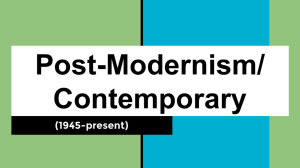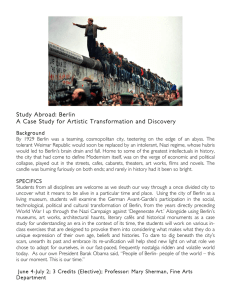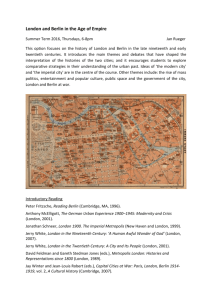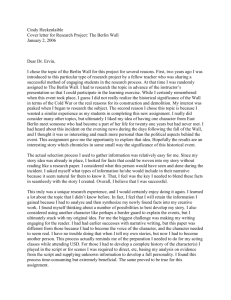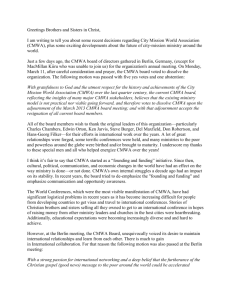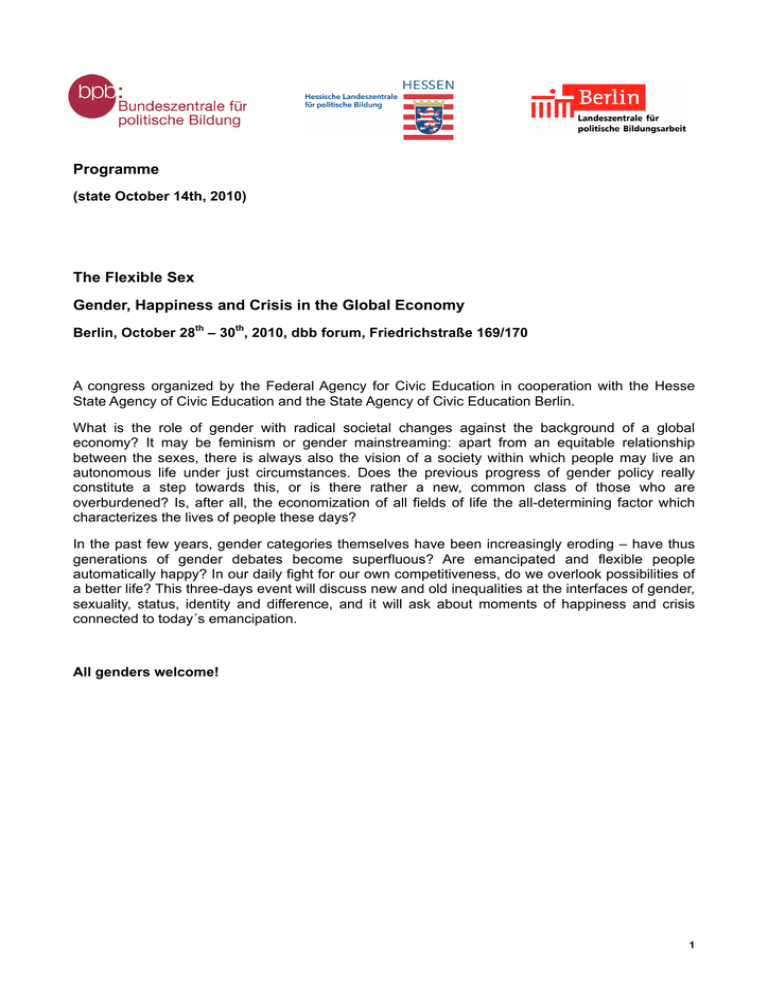
Programme
(state October 14th, 2010)
The Flexible Sex
Gender, Happiness and Crisis in the Global Economy
Berlin, October 28th – 30th, 2010, dbb forum, Friedrichstraße 169/170
A congress organized by the Federal Agency for Civic Education in cooperation with the Hesse
State Agency of Civic Education and the State Agency of Civic Education Berlin.
What is the role of gender with radical societal changes against the background of a global
economy? It may be feminism or gender mainstreaming: apart from an equitable relationship
between the sexes, there is always also the vision of a society within which people may live an
autonomous life under just circumstances. Does the previous progress of gender policy really
constitute a step towards this, or is there rather a new, common class of those who are
overburdened? Is, after all, the economization of all fields of life the all-determining factor which
characterizes the lives of people these days?
In the past few years, gender categories themselves have been increasingly eroding – have thus
generations of gender debates become superfluous? Are emancipated and flexible people
automatically happy? In our daily fight for our own competitiveness, do we overlook possibilities of
a better life? This three-days event will discuss new and old inequalities at the interfaces of gender,
sexuality, status, identity and difference, and it will ask about moments of happiness and crisis
connected to today´s emancipation.
All genders welcome!
1
Thursday, October 28th, 2010
Arrival and registration at the dbb forum
5:00 p.m.
Opening
Thomas Krüger, President of the Federal Agency for Civic Education, Bonn
Key lecture
Susan Pinker, journalist and author of the book: The Sexual Paradox,
Canada (in English with translation to German)
Discussion
Moderation: Claudia Neusüß, Technical University Berlin
Reception
Friday, October 29th, 2010
9:00 a.m.
Key lecture
Eva Illouz, sociologist, The Hebrew University of Jerusalem
Discussion
Moderation: Claudia Neusüß, Technical University Berlin
10:00 a.m.
Coffee break
10:30 - 1:30 p.m.
Parallel fora
Forum 1: Gender, Power and Glass Ceilings: Disillusionment in the “Female Republic”?
There are more and more countries in which women occupy high and highest governmental
positions. With the beginning of Angela Merkel´s chancellorship also Germany was already
declared a “female republic”. However, how much leeway is there for new ways of doing politics?
This forum will question the conditions supporting the rise of women as well as the factors by which
a “femalization of politics” could be measured at all. Is it still possible at all to ask the question if
women put different topics on the agenda? And what about gender mainstreaming, which was
once so much hyped by politics, and about the role of gender in individual political fields such as
climate, foreign policy and economy?
Furthermore, the forum is meant to have a look at the democratic potential of female decision
2
makers. Angela Merkel and her successful colleagues have made women in political leading
positions a matter of course and have created new role models for coming generations. But is it not
that the biographies of the female leadership elite are far from being socially representative.
Is gender democracy only valid for elites? And are female representatives interested at all in
questions of emancipation and the breaking up of dominant structures?
Lecture by:
Birgit Sauer, University of Vienna
Discussion with:
Sabine Heimbach, Deputy Speaker of the Federal Government
Andrea Fleschenberg, University of Hildesheim
Hilal Sezgin, author and journalist
Moderation: Mechtild Jansen, Hessische Landeszentrale für politische Bildung
Rapporteur: Nora Fiechtner, Free University Berlin
Forum 2: The New Housekeepers? – Crisis Management in a Male-Dominated Economy
Despite professional qualifications of equal or higher value, still today women play a minor role
when it comes to occupying positions with supervisory boards or among top management. And
although there is evidence that an enterprise will work more efficiently, more successfully and more
profitably if at the top decisions are equally made by people of different gender socialization, in the
past few years only two women have been holding board positions with DAX 30 enterprises.
In the meantime has the crisis of the global economic and financial system brought any change to
the management structure? In some European countries the governments have become active: in
2008 Norway has legally fixed a woman quota of 40 per cent for the supervisory bodies of listed
enterprises. Sweden and Finland have followed the example. In Germany, Telekom was the first
DAX 30 enterprise to introduce a woman quota. Until 2015, 30 per cent of senior and junior leading
positions are supposed to be occupied by female managers. At the beginning of this year the
Hypovereinsbank called into life the first women’s advisory council at a financial institute, and for
the first time in its history the SAP software group has appointed a woman to the board.
What do these developments indicate? Are women better managers in times of crisis? Is this now
their opportunity to lastingly establish with top management? Is it about gender justice or about a
profitable step under the point of view that in Germany women’s wages are 23 per cent on average
below those of their male colleagues and that many fields of work for women are still completely
unpaid?
Discussion with:
Gülay Çağlar, Humboldt-University of Berlin
Elke Holst, German Institute of Economic Research
Alexander Nöhring, Humboldt-University of Berlin
3
Jutta von Falkenhausen, MPA, FidAR (Women on the Board of Directors)
Moderation: Helga Lukoschat, EAF | European Academy for Women in Politics and Business
Rapporteur:: Clara Mansfeld, Historian
Forum 3: Precarious Circumstances: Self-Fulfilment by a Mini-Job?
Once, professional work for women was considered a step out of custody. Nowadays, full-time jobs
are a disappearing model. They are increasingly replaced by “precarious” employment such as
subcontracted employment and temporary work, temporary jobs, mini-jobs or the everlasting
period of practical work. They are characterized by low, interrupted or even lacking income,
unpredictable periods of being employed, insufficient social security, lacking access to worker
participation and employee protection, little career opportunities and maximum readiness. Women
make the vast majority of people in precarious employment. While wishing to combine family and
job, to find self-fulfilment by way of creativity or to be socially committed, often they connect the
hope for individual flexibility and a maximum of time management to these kinds of employment.
Often, however, the labour market offers no other choice.
Meanwhile, even a full-time job does not guarantee an income securing a living. In the constantly
growing German low-wages sector women are the great majority with almost 70 per cent – often
despite professional qualification or university entrance qualification. Inevitably these kinds of
employment are connected to the danger of a life in poverty. How could we work against such
developments? What has become of the promise of freedom by way of work? What must be the
goals of gender-just economic and social policies in the current situation? And are there answers
beyond the classical markets?
Lectures by:
Isabell Lorey, currently Humboldt-University of Berlin
Hildegard-Maria Nickel, Humboldt-University of Berlin
Discussion with:
Esra Erdem, University for Economics and Law Berlin
Iris Kronenbitter, National Agency for Women Start-ups Activities and Services (bga)
Daniela Rastetter, University of Hamburg
Moderation: Julia Seeliger, die tageszeitung
Rapporteur: Julia Chojecka, EAF | Europäische Akademie für Frauen in Politik und Wirtschaft
Berlin e.V.
Forum 4: Media Heroes and „Female Role Models“ – Dirty Laundry and Successful
Biographies
Wherever we may look, we see power women and alpha girls. Not only that they do everything
4
which was once reserved for men, no, they even do it better: They achieve better marks and
grades, they are ahead in respect of professional qualification, they are determined, efficient and
self-confident. After having completed their education, they reconcile child and career, always act
in a well-organized way yet spontaneously, nevertheless looking sexy and relaxed. How are we
supposed to deal with these female model biographies which the media never get tired of
reproducing? How are role models produced in the context of global economy and who produces
them? Do female public people work in favour of actual challenges of private life staying in the
dark? When do female heroes wash their dirty laundry, after all? This forum will ask about the
contributions by pop culture, casting shows and the Internet to the image of the perfect
superwoman – and if, given increased pressure to perform, we need honest anti-heroes.
Lecture by:
Angela McRobbie, Goldsmiths, University of London (in English without translation)
Discussion with:
Sonja Eismann, Missy Magazine
Mely Kiyak, journalist and author
Ulrike Prokop, Philipps-University Marburg
Moderation: Sharon Adler, AVIVA-Berlin
Rapporteur: Gesche Gerdes, University Münster
Forum 5: Brain Drain? Boys and Girls in Educational Competition
Why is it that suddenly so many people speak of supporting young males? Are boys not able these
days to compete with well-trained, ambitious girls anymore? Is there really a lack of male
communicators and models, or does the whole educational system suffer from overstrained
educators and teachers? What are the effects of the economization of education in the context of
the Bologna Process on the educational careers of the sexes? At this forum, education and brain
research will discuss how gender is learned and who is fit for knowledge society.
Lecture by:
Manfred Spitzer, University of Ulm
Discussion with:
Heike Kahlert, University of Rostock
Paul Mecheril, University of Innsbruck
Sigrid Metz-Göckel, Technical University Dortmund
Moderation: Jürgen Kaube, Frankfurter Allgemeine Zeitung
Rapporteur: Katrin Dreier, ABqueer e.V.
5
Forum 6: New Spaces, Old Borders? – Gender in a Migration Society
Why are some migrants perceived as victims, and how do they reject this role? Even feminists give
different answers to this question. Which leeways of action have migrants opened up for
themselves – self-organized and/or according to the mainstream – where do old borders still exist,
and where do new ones become visible? This forum will take stock: Who does women policy in
Germany, and in favour of whom is it done? Where are self-determined (post-)migrant positions
located within majority society, e.g. those of black or Muslim women/lesbians from the North, East,
South or West or from the midst of Germany? In which way do they fight their way out of
attributions, and where do they experience structural insecurity? By what can repression, sexism,
racism be recognized – by the scarf, by career opportunities or by residential permits? At this
forum, people from the fields of culture, politics and educational work will discuss the meaning of
flexibilization for Germany’s migrant society.
Discussion with:
Gabriele Dietze, Humboldt-University of Berlin
Tülin Duman, GLADT e.V.
Lamya Kaddor, religious educationalist and author
Sharon Otoo, Limited to You
Moderation: Mariam Lau, Die Zeit
Rapporteur: Petra Rost, Humboldt-Universität zu Berlin
1:30 - 3:00 p.m.
Lunch break (at your own disposal)
3:00 - 6:00 p.m.
Parallel fora (4.00 – 4.30 p.m. coffee break)
Forum 7: Fit for Reproduction? Bodies for Achievement-Oriented Society
Ways of planning reproduction as well as the respective possibilities have fundamentally changed:
for a variety of reasons, homo- and heterosexual men and women more and more postpone their
wish to have children. Ever more often they reach back to the possibilities of modern reproductive
medicine or use global surrogate mothers.
In this context, the debate on ethics, morality and dignity happens in different ways. Debates on
demographic developments, the right to one’s own body, “securing the future” and embryo
protection collide. Given the ever more extensive possibilities of prenatal diagnostics, are there
limits anymore for man being confronted with ever higher demands? Is there room anymore for life
beyond the bio-political norm? Have we arrived in the age of post-humanism? Experts from the
fields of biology, medicine, sociology, law and ethics will discuss modern ways of reproduction and
the child as an “achievement”.
Discussion with:
Lena Correll, Philipps University Marburg
Sarah Diehl, africa scientist and filmmaker
Anne Waldschmidt, University of Cologne
6
Moderation: Martin Spiewak, Die Zeit
Rapporteur: Anna Carina Böcker, Universität Wien
Forum 8: I’m Porno – The New Sexual Revolution?
For decades the advertisement business has been conditioning us to react by material desire when
being confronted with sexy images, and often we have become used to crossing the border to
sexism and pornography, as long as it creates added value. Now, by way of new media the sexual
lives of a whole generation are newly negotiated at a semi-private and semi-public level, and there
is great confusion and even indignation about this new way of referring to one’s own body and this
new lust for displaying oneself. What are the effects of this new porno fashion on our sexualities
and our relationships?
Do-it-yourself pornos are traded at online sites as an expression of sexually experiencing oneself.
Porno rap musicians present sexuality as a form of rebellious violence which constantly goes
beyond the border to despising women and to homophobia, and across the nation they are
successful with this. But also women are active with this development. Is it the heritage of a sexual
revolution which has fallen asleep, a result of social bluntness if parents at home are watching
hardcore pornography, or is it a playful answer to a new kind of puritanism? How much self-fulfilling
are these new body images, and what do they make us want to do?
Discussion with:
Antke Engel, Institute for Queer Theory
Johannes Gernert, author
Linda Hentschel, Weißensee School of Art Berlin
Silja Matthiesen, University Hospital Hamburg-Eppendorf
Tim Stüttgen, film scientist and performer
Moderation: Nana Adusei-Poku, Humboldt-University of Berlin
Rapporteur: Fleur Weibel, University Basel
Forum 9: Twosome Democracy? Presence, Resistance and Prospects
Although everybody is talking about gender democracy, ideas that only two sexes are normal, that
is “man” and “woman” are widespread. The human rights of people who are not interested or not
able to meet these criteria are continuously violated. At the same time, by way of trans- and
intersex movements there is growing resistance against this kind of discrimination. What is the
situation of the reform of the legal foundations for and the social acceptance of intersexual and
trans-people and their ways of life? This forum will discuss questions such as these, just as the
international prospects for gender democracy beyond heteronormativity.
Discussion with:
7
Eveline Kilian, Humboldt-University of Berlin
Ulrike Klöppel, Charité, Berlin
Ins A. Kromminga, International Association of Intersexual People (IVIM)
Konstanze Plett, University of Bremen
Arn Thorben Sauer, TransInterQueer e.V.
Uta Schirmer, RheinMain University of Applied Sciences
Moderation: Adrian de Silva, Humboldt-University of Berlin
Rapporteur: Kristina Warncke, Goethe-University Frankfurt am Main
Forum 10: Family as a Matter of Negotiation: How Does Workshare Function With a
Patchwork Family?
For all times family has been a place where gender relationships are defined and equal rights are
negotiated. Given changed economies of caring, bringing up children – both for single parents and
couples – becomes a challenge which often cannot be coped with without hiring services. Women
who despite having a family consistently pursue their careers close this caring gap by hiring the
services of (migrant) women from lower classes who take over that role which they have given up
on for themselves. How can family work and gainful employment be made compatible beyond the
classical, gender-oriented division of work? Which new role models characterize our society and
contribute to also men exchanging gainful employment for a parental period? Are the effects of
taking time off the same for men and women, and what will be the consequences for women if the
new kind of fathers insist in their rights? For whom have demands become higher, for whom do
they result in overburdening? Experts will discuss new models of living together between the ideal
and daily life.
Lecture by
Uta Meier-Gräwe, Justus-Liebig University Gießen
Discussion with:
Lisa Herrmann-Green, psychologist*
Robert Habeck, author
Karin Jurczyk, German Youth Institute
Ahmet Toprak, University of Applied Sciences and Arts Dortmund
Moderation: Sonja Eismann, Missy Magazine
Rapporteur: Verena Stange, Pedagogue
8
Forum 11: A Love Like Bookkeeping: Romantic Affairs and Pragmatism in the Age of
Consumption?
The economization of all fields of life has even reached our emotions: Experts predict a turning
away from the love match and an increase of choosing partners for purely pragmatic reasons. At
partner finding services and dating agencies, potential dream partners are found according to
members’ detailed personality profiles. Still, for women one important criterion is social status and
high income, however the suitable clientele is running out. German men, on the other hand, are
rather interested in loving “downwards”. Will ‘social software’ turn out to be an efficient machine of
social segregation? How are ways of life and level of income connected? In this respect, are
homosexual couples different from heterosexual ones? Why is it that only binational marriages are
checked for romanticism and criminalized as “sham marriages”? A discussion on the new borders
and open markets of love and desire.
Discussion with:
Judith Alwin, author and model
Tanja Ostojic, artist
Bastian Schwithal, sociologist and media manager
Moderation: Mercedes Bunz, The Guardian
Rapporteur: Sarah Speck, Humboldt-University Berlin
Saturday, October 30th, 2010
10:00 a.m.
Key Lecture
The demand for equal rights and equal opportunities was supposed to make
better life possible. But has this objective been achieved, after all? Apart from
success records, a particular development is conspicuous: women are less
satisfied and suffer particularly from depression and burnout. But has
happiness ever been the suitable parameter? And who or what defines a
good life?
Miriam Meckel, University of St. Gallen
Discussion
Moderation: Ferdos Ferudastan, journalist
11:15 a.m.
Reflexion on the congress
Claudia von Braunmühl, Free University Berlin
9
11:30 a.m.
Concluding statement by the organizers
Petra Grüne, Milena Mushak, Federal Agency for Civic Education
12:00 a.m.
In the foyer:
Snack
Transitions in Central and Southeastern Europe –
Changing Gender Perspectives
The multidisciplinary research-project examines two decades of post-socialist transformation under
gender relevant aspects in eleven counties of east- and south-europe. The analysis of the
democratic development, of family life and parenting, health, care and division of work, new
poverty, discrimination, education, employment and equal oportunities, political representation and
representation of gender roles in the public show how gender stereotype ideologies and practices
shaped crucially the social, economical and political conditions of the last two decades. Parts of the
project will be presented on blackboards at the congress.
The project was launched by ERSTE Foundation (www.erstestiftung.org).
Project coordination: Krassimira Daskalova, Caroline Hornstein Tomić, Karl Kaser
1
0

